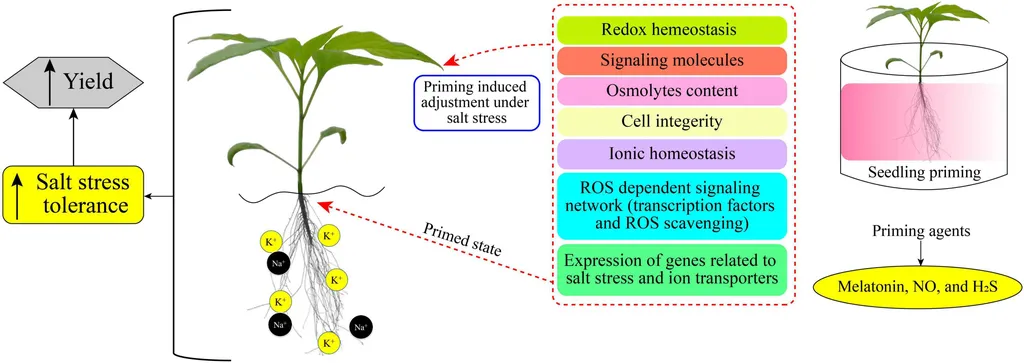In the heart of Fujian, China, a team of researchers led by Liu Shengcai from the Institute of Horticultural Biotechnology at Fujian Agriculture and Forestry University has made a significant stride in understanding how pepper plants cope with salt stress. Their findings, published in the journal *Plant Stress* (which translates to *植物应激* in English), could have profound implications for agriculture, particularly in regions where soil salinity is a growing concern.
Pepper, a widely cultivated vegetable, is particularly sensitive to salt stress, which can severely limit its growth and yield. The team’s research focused on the CaNAC014 gene, which previous studies had shown responds to NaCl stress. However, the molecular mechanisms behind this response remained a mystery.
To unravel this mystery, the researchers employed a combination of genetic engineering techniques. They created an overexpression vector, pRI101-AN-CaNAC014-EGFP, and a virus-induced gene silencing (VIGS) vector, pTRV2-CaNAC014, which they introduced into the leaves of two pepper varieties, ‘FJNY-1’ and ‘FJYM-1’, using an Agrobacterium-mediated method. The plants were then treated with 150 mM NaCl to simulate salt stress conditions.
The results were striking. Plants overexpressing CaNAC014 showed enhanced salt tolerance, with improved growth, root development, and significantly higher chlorophyll levels and photosynthetic performance under salt stress. In contrast, the silent plants exhibited the opposite results.
“These findings highlight CaNAC014 as a pivotal transcriptional regulator in pepper salt tolerance,” said Liu Shengcai, the lead author of the study. The team also discovered that CaNAC014 is located in the nucleus and can bind to the CaSOS1 promoter, a finding that was demonstrated through yeast one-hybrid and dual-luciferase assays.
So, what does this mean for the future of agriculture? As soil salinity continues to rise due to factors like climate change and poor irrigation practices, understanding how plants like pepper can tolerate salt stress is crucial. This research provides valuable insights into the molecular mechanisms of salt stress adaptation, which could pave the way for developing salt-tolerant pepper varieties.
Moreover, the techniques and findings from this study could be applied to other crops, potentially revolutionizing agriculture in salt-affected regions. As Liu Shengcai put it, “This is not just about pepper. It’s about understanding the fundamental mechanisms of salt stress tolerance, which can be applied to a wide range of crops.”
In the broader context, this research could also have implications for the energy sector. As the world shifts towards more sustainable energy sources, bioenergy crops are gaining traction. However, many of these crops are also sensitive to salt stress. By enhancing their salt tolerance, we could potentially expand the range of lands suitable for bioenergy crop cultivation, contributing to a more sustainable energy future.
The study, titled “CaNAC014 transcription factor enhances salt stress tolerance in pepper by regulating the activity of the CaSOS1 promoter,” was published in the journal *Plant Stress*, offering a beacon of hope for agriculture in an era of increasing soil salinity.

